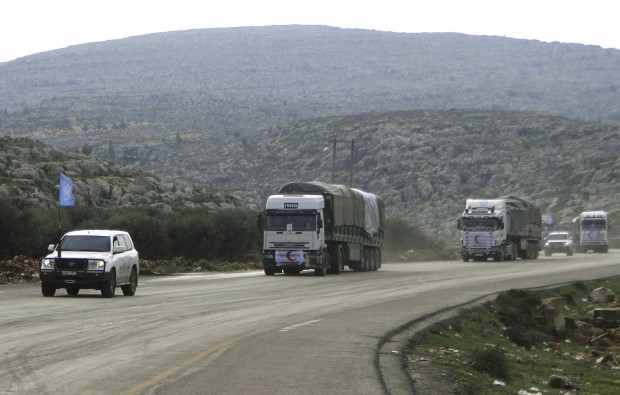
A United Nations High Commissioner for Refugees and Syrian Arab Red Crescent convoy carries aid through Aleppo’s countryside January 30, 2013. REUTERS/Mahmoud Hassano
Yet some five million are suffering more than the rest from cold and hunger. Some of them are sleeping out in the open whilst others are living in caves because the relief blankets have not reached them, nor have they reached the international refugee camps. Many of them have neither bread nor heat. That is why we call upon the Arab governments, and regional and international organizations, not to leave the Syrian people to perish between massacres and starvation. The least we can do is provide them with the means to help them survive like shelter, blankets, food, and clothes.
Our expectations have never been lower; all we are asking for now is bread and firewood. At the beginning, we called for foreign intervention to deter al-Assad’s forces and stop the genocide, and then we reduced our demands to Stinger missiles, in order to stop the planes that have been bombing towns and burying people alive for the past 16 months.
However, al-Assad and his Iranian friends, together with their temporary ally the harsh winter, would be wrong to believe that the Syrian people have been tortured enough to wave the white flag and accept a return to the regime’s iron grip. Most Syrians, including the millions facing death homeless and hungry, or those trapped in their homes and starving, are not going to exchange blankets and bread for a return to the al-Assad regime. This is an indisputable fact; going back is no longer an option. The Syrians have paid a dear price; they have lost their homes and children and have been waiting for too long. They will never go back to the conditions of al-Assad’s rule and those who think they can take advantage of the tragedy to impose their political agenda are delusional.
Little will change through meetings in Geneva or visits to Moscow, whether by mediators or ministers. The Syrians have decided to fight until they topple the regime with their own hands, and with whatever weapons are available to them. It is futile to continue looking for a peaceful solution with al-Assad remaining in power, whether actively or symbolically. It is too late for proposals about the partial transfer of power and an honorable exit for al-Assad and his government. This is how those banished in tents in Jordan and Turkey feel, and the same applies to those holding on in their besieged neighborhoods in Darayya, Hama, Homs, Daraa, and other destroyed districts across Syria. That is why members of the Syrian National Coalition and the rest of the opposition will never agree to a political solution that does not explicitly involve the ouster of al-Assad.
And because the Syrians are fighting on several fronts – against al-Assad, the winter and the lack of international support – the best they can get now is the aid to help them overcome this harsh season. Then they will be better able to overthrow this already-collapsing regime.
